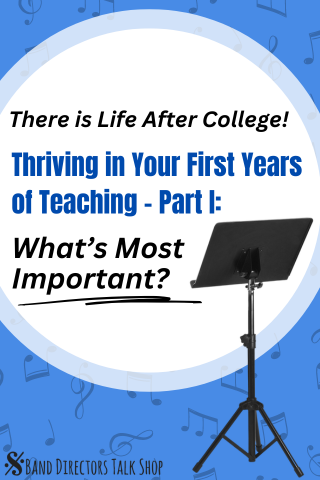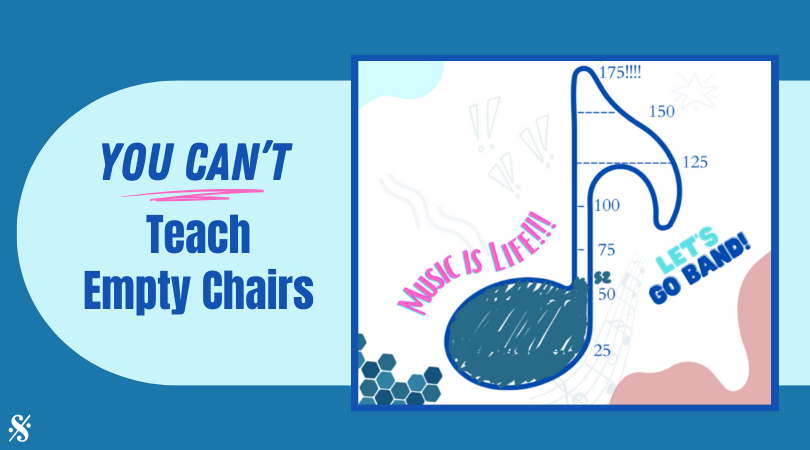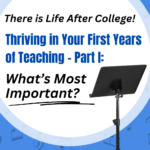Students, Adults, and Curriculum. If asked to put them in order of importance, what would you rank first? If you said students, you would be correct! But what exactly does that mean? Many of us decided to major in music education because we loved to play our instruments, and maybe didn’t initially think so much about the nuts and bolts of teaching music to young children (I know this was the case with me). However, after all of the undergraduate music courses and teacher certification exams, you find yourself standing in front of your own group of students. You are bursting at the seams with all of this musical knowledge and you cannot wait to inject this information into your students’ brains and make them love music just as much as you do! However, it’s not always that simple.

Curriculum – #3
A lot of times, new teachers place great importance on curriculum. You might be asking, what’s the problem with that? It’s important to be teaching content to our students through high-quality and rigorous lessons; however, we have to understand how students think and operate before we can deliver our curriculum successfully. Instrumental music differs from many core subject areas in that band directors are typically responsible for creating their own curriculum instead of having an assigned book series to teach from. In the beginning, it’s hard to know what to teach when you are inexperienced and new to a school! There is a necessary trial and error period to find out what works and what doesn’t for each particular group of students. A lesson plan can look like a million bucks on paper but can fall flat when played out in real time if we don’t truly understand what motivates and excites our students.
Adults- #2
I don’t remember ever having discussions in my college courses about how to work with other adults and why this is such an important piece of the puzzle. But yet, it’s an area where many teachers (not just new ones) falter. If I can play my instrument well and manage a classroom of students, that’s enough, right? Well, my clarinet playing ability wasn’t at the top of the list of “helpful life skills” the first time I had an angry parent yelling at me, or when I had to work out a scheduling conflict with a colleague so that an academically struggling student could continue to attend our pull out band sectionals. Remember, it’s about “we,” not “me”. At the end of the day, everyone is just trying to do their job and while band might be the center of our world, it’s just a part of the overall school puzzle for everyone else. Be professional, stick to facts, not feelings, and always let an email sit in drafts overnight before you press send when strong emotions are involved (better yet, ask someone you trust to read over it first!). You never get a second chance at a first impression, so work to be a problem solver and stay flexible- it’s easier to prevent fires than to put them out later!
Students- #1
Music teachers are some of the most passionate individuals on this earth. We are one of the few groups of people that took a hobby from childhood and turned it into our life’s work. You have to be passionate about music, but you must be more passionate about kids to succeed as a music educator. Have you ever heard the phrase, “They don’t care how much you know, until they know how much you care?” It’s absolutely true. My first year of teaching, I remember working with a beginner clarinet that could barely put the instrument together. One particular day, I spent far too much time telling him all of the things I could play on clarinet, and I even showed him part of my senior recital video. I cringe at this memory now. I could barely tell you anything about this student personally; what his background was, his home life, his academic achievements- but yet, I thought showing this ten-year-old a video of my senior recital would magically motivate him into becoming this amazing clarinetist. I’ll give you one guess as to how that worked out. The good news is, I learned from that misstep. I have a vested interest in every single student that walks into my band room. I make sure that everyone is individually greeted each day. I ask them about their basketball games, their 4H shows, and their new haircuts – most times, it’s not even musically related. I have to know them as individuals before I can even start to think about teaching them to be incredible musicians. When students feel supported and cared for, they want to work harder and achieve at a higher level.
1- Students, 2- Adults, 3- Curriculum. You can’t get to #3 if you don’t have #’s 1 and 2 mastered. Without good people skills, it will not matter one bit how impressive your curriculum guide is.
Kathleen Amabile is the Band Director for Grades 5-12 in the Elk Lake School District (Susquehanna County, Pennsylvania). She began teaching in the district in 2009 and directs all of the instrumental ensembles in the district, and serves as the Fine Arts Department Chair. Kathleen is also an adjunct instructor at Clarks Summit University, where she instructs woodwind lessons and music education courses and has previously served as an interim adjunct clarinet instructor at Marywood University.
Related Reading:
Organizing for Success as a Novice Band Director
College Years – What Was Left Out
Dear Future Music Educators
If you would like to receive our weekly newsletter, sign up here.
Don’t forget to like us on Facebook too!
Learn. Share. Inspire.
BandDirectorsTalkShop.com






Leave a Reply
You must be logged in to post a comment.